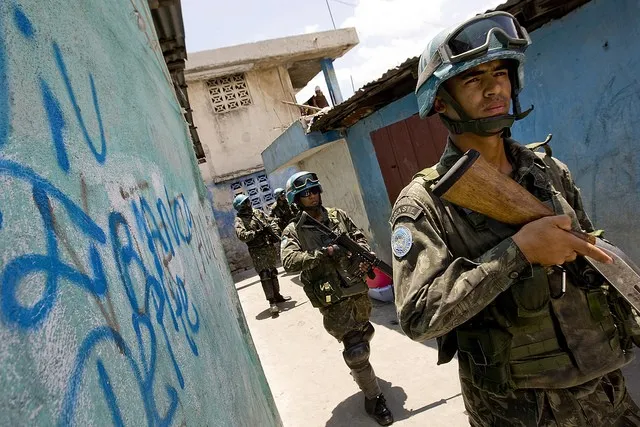The Haitian Times
www.haitiantimes.com
By J.O. Haselhoef, Murdith Joseph, Juhakenson Blaise

PORT-AU-PRINCE — For decades, hundreds of nonprofit organizations have swooped into Haiti with the goal of “helping Haitians.” With each voyage, the volunteers carried luggage stuffed with medicines and bandages for temporary clinics, school supplies for an upcoming semester, even power saws for constructing bridges.
These nonprofit volunteers, often returning on frequent occasions over many years, also brought along skills from their own formal education and work experience — nursing, construction, teaching, agriculture. Among those who arrived after the 2004 coup d’etat, some remember a general peacefulness at the sight of blue-helmeted United Nations troops milling about at Toussaint Louverture International Airport.
Now, with Haiti hitting a record low, many of those nonprofit volunteers say the solution to the current gang crisis is for the U.N. or Organization of American States (OAS) to intervene more aggressively.
“We can sit and figure out the long-term plan and the short-term plan and all that, but quite frankly, [Haitians] need intervention,” said Dr. Ted Higgins, founder of Higgins Brothers SurgiCenter.
“It’s just not going to happen any other way,” said Higgins, whose specialty hospital is based in Fond Parisien, 23 miles east of Port-au-Prince. “Gotta get some troops back down there to just clear the road so we can get transportation through.”
Diane Lovett, another nonprofit volunteer who has worked with Friends of the Children medical mission in La Croix, acknowledged that humanitarian groups used to feel safe enough to send people to support medical, agricultural, educational, sanitation and housing needs. They can no longer do that.
“It would be far better and more appropriate to address Haiti’s needs from either the United Nations or the OAS,” Lovett said. “It should be a collaborative effort by world and regional leaders.”
Haitians say “no” to foreign forces
In contrast, many Haitians feel indignant at the idea that a foreign power would invade their national sovereignty. For some, it brings back painful memories of the U.S. occupation from 1915-1934 and by the UN Stabilization Mission in Haiti (MINUSTAH) from 2014-2017.
“The international community, including the United Nations, is very much responsible for the decline of the country’s situation and the insecurity that exists in Haiti,” said Vénel Bozile, a resident of Santo in Port-au-Prince.
A new U.N. force alone won’t solve the insecurity crisis, as shown by MINUSTAH’s 13-year deployment. Nothing was resolved, the insecurity is still there, Bozile said.
“A return of the UN soldiers would always be in the objective of exploiting the country’s natural resources,” he added. “The Haitian people have the solution to the problems that plague the country currently. Those who still have their dignity must agree to come with the solution.”
During a June session of the U.N. Security Council, the Haitian government made it clear it doesn’t want a new U.N. force in the country. Instead, it said, the international community should support the National Haitian Police (PNH).
“It is not desirable that the international community or foreign forces become substitutes to the police,” Jean Vitor Généus, Haiti’s Minister of Foreign Affairs said during the June session. “After the departure of the first international forces, the local structures found themselves unable to perform the same tasks, because they did not receive adequate training and did not have the same means.”
For decades, Haitians have seen foreigners cycle in and out of Haiti.

In 1914, the U.S. sent Marines into Haiti and forced the signature of the Haitian-American Treaty of 1915. The articles of this agreement created a military force, controlled by the U.S. Marines, and gave the U.S. complete control over Haitian finances and the right to intervene in Haiti whenever the U.S. government deems it necessary. A series of Haitian strikes and uprisings led the United States to begin withdrawal from Haiti, completed in 1934.
In 2004, U.N. peacekeeping troops were brought to Haiti to stabilize the nation, requested by the acting president, initially for six months. The mission was extended because of Haiti’s “evolving requirements,” and the devastation of the 2010 earthquake. By the end of the 13 years, the controversies surrounding the U.N. challenged the benefits of its presence. A U.N. facility infected Haitian water sources with cholera, killing over 9,000 Haitians, and at least 134 U.N. peacekeepers were involved in sexual abuse scandals.
Marilene Phipps-Ketterwell, a Haitian American artist, author and poet in the Minneapolis-St. Paul area, said political behavior in politicians must change. Foreigners savaged the population, murdered and tortured, all for economic gain.
“The solution would be for human beings to put a hold on their greed — on the malignant form of narcissism that was revealed in colonialism, thinking that people can be owned — that whatever your neighbor has can be yours,” Phipps-Ketterwell said.









